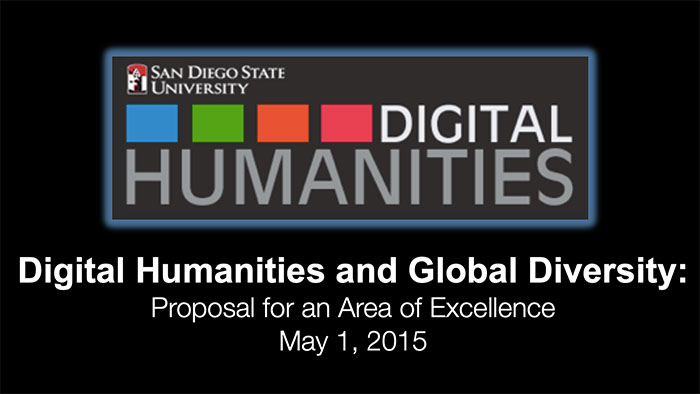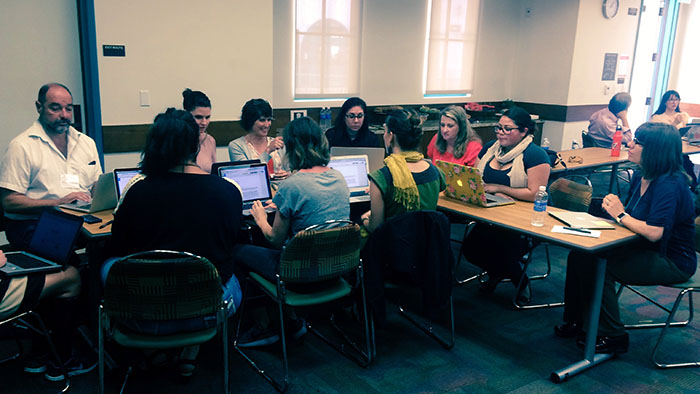About
Advocating for the Humanities in a Digital Age
“Digital Humanities” describes efforts to study digital technologies and culture, employ computational practices in research and teaching, and reflect upon the impact of the digital. The Digital Humanities Initiative at SDSU promotes such critical engagement by providing a hub for innovation and collaboration across campus.
In 2015, we were recognized as an Area of Excellence (.pdf). This enables us to cultivate grassroots, ground-up expertise (as opposed to a top-down model of hiring experts and funding single projects), inspire our faculty and students, and lead the regional cross-institutional network for digital humanities in San Diego: SD|DH.
Why the SDSU Digital Humanities Initiative Matters
The advent of digital technologies rivals the invention of the printing press in its impact on all aspects of human experience. Study of the digital compels innovation in research methods and perspectives as well as the forging of new partnerships conducting this work. Digital technologies create new ways of seeing, knowing, and communicating; new modes of distributing resources, ideas, and information; and new interfaces for interaction among diverse human communities.
The Digital Humanities Initiative at SDSU generates humanistic critical research about the digital shift with a specific focus on diversity, aligned with our institutional commitment to diversity. Given our legacy as an institution serving a diverse student body and location on an international border, we’re obliged and empowered to ask and answer essential questions about how technological change intersects with global diversity—questions no other digital humanities program in the country has taken on in a substantial way.
New digital tools for creation, distribution, and consumption are not diffused evenly across human societies and research indicates differences in the way certain ethnic populations use technologies. Our research seeks to produce a higher grade of knowledge about the social and cultural implications of diversity within the increasingly complex digital landscape and generate new thinking about how technology can be used to address human challenges across diverse populations.
By building a network of existing faculty and executing strategic new hires as well as fostering collaboration across the university and region, we’re transforming the national conversation on the impacts of the digital and developing a uniquely focused approach to the interrelated cultural, intellectual, and epistemological dimensions of the digital. We look forward to continued community growth and advocating for the humanities in a digital age.
History and Recognitions
In 2013, Joanna Brooks (then Chair of SDSU’s Department of English and Comparative Literature) ventured across town to UCSD to hear Jessica Pressman and N. Katherine Hayles discuss their edited collection Comparative Textual Media: Transforming the Humanities in the Postprint Era. The book argues that the study of text is the study of media and thus strives to help humanities departments, especially literature departments, recognize and claim the important role they serve in training students for the digital ecology.
After the talk, Joanna asked Jessica to help apply this paradigm to a particular department: English and Comparative Literature at SDSU. Together, they developed a ground-up approach to using digital humanities to inspire faculty learning: to stimulate interest in new research questions or practices, to build community around these issues, and to experiment in ways of translating this new knowledge into lessons for the classroom.
History of DH
In 2015, we were recognized as an Area of Excellence (.pdf). This enables us to cultivate grassroots, ground-up expertise (as opposed to a top-down model of hiring experts and funding single projects), inspire our faculty and students, and lead the regional cross-institutional network for digital humanities in San Diego: SD|DH.
During that first year, we piloted grassroots programming efforts to inspire interest in digital studies, for faculty and students. These efforts included Digital Pedagogy Learning Community, Faculty Research Group, Reboot Faculty Camp.
We also hosted special events that served our larger goal of stimulating digital humanities activity and community formation: THATCamp: Diving into Digital Humanities, Electronic Literature Reading Event, and special guest lectures.
In Fall 2015, Jessica Pressman joined the ladder faculty in the Department of English and Comparative Literature, where she continues to direct the Digital Humanities Initiative. We received a start-up grant from the National Endowment for the Humanities to build a regional network around digital humanities pedagogy.
We were also awarded an Area of Excellence in “Digital Humanities and Global Diversity,” which allowed us to hire tenure-track faculty in different disciplines and build a research emphasis in Digital Humanities at SDSU.
Finally, we began the annual eLit competition.
In 2016 and 2017, we welcomed new faculty hired under the Area of Excellence: Pamella Lach (DH Librarian) and Nathian Rodriguez (Journalism and Media Studies).
We co-organized, with the SDSU Library, The Year of the Book—a yearlong series of programming about the book as technology.
We co-organized a regional showcase event—our first showcase of DH research at SDSU (December 2016).
Beyond campus, we co-organized a regional DH Event Learning through Digital Humanities: A Showcase at USD.
Finally, we broke ground on the new Digital Humanities Center.
With the arrival of Digital Humanities Librarian Pamella Lach in Fall 2016, the DH Initiative began work to create a dedicated DH Center in SDSU Library. In Fall 2016 Pam led design workshops to develop a shared vision for the space. Work to build the space began in summer 2017, and the DH Center unofficially launched in November, 2017. We held a grand opening and ribbon cutting ceremony at the second annual Digital Humanities Showcase in April, 2018.
We welcomed new hired, hired under the Area of Excellence funding category: David P. Cline (History) and Gabriel Doyle (Linguistics).
The Digital Humanities Center opened.
Our last hire in the Area of Excellence, Angel David Nieves (History), joined the faculty.
We worked to design and develop the operations of the Digital Humanities Center, and we held our first full-blown DH Showcase in the Center in May 2019!
We piloted a new experiment in public DH outreach. In fall 2018 SDSU’s Digital Humanities Initiative partnered with ARC After-School, a California-based company dedicated to working with students to help emphasize learning through experience, to create an after-school curriculum on electronic literature. The pilot program, Digital Studio, aimed to bridge the digital humanities between the university and local high schools and to provide teaching opportunities for SDSU students interested in experimental literature and cutting-edge learning adventures for high school students. The curriculum was designed by Tina Lumbis, a graduate student in the MFA program in SDSU’s English and Comparative Literature Department, with Professor Jessica Pressman (English and Comparative Literature), and the lessons were taught by graduate students Brenda Taulbee (MFA in SDSU’s English and Comparative Literature Department) and Katie Chestnut (Education). Jared Zeiders (MA in SDSU’s English and Comparative Literature Department) supported instruction and wrote the blog posts to document the pilot program.
Angel David Nieves took over the role of Co-Director, with Pam Lach; in May, Jessica Pressman stepped back into the role of Interim Co-Director, when Angel David Nieves left SDSU.
When the global pandemic closed campus and indelibly changed our lives, we realized that DH is not just a field of study or a perspective of practice but an absolutely vital aspect of ALL teaching, researching, and living in our new, online age. We felt the needs of our community, and we set out to meet them.
We worked hard during Summer 2020 to develop and rollout on online resource to support faculty with DH pedagogy. Teaching During/Beyond Quarantine (“Teach DH”) is a curated website that shares best practices of our DH faculty, showcasing their brilliant work and using the offerings of DH@SDSU to get through these hard times.
Starting the semester online, due to Covid19, we prepared a semester’s worth of online programming that would serve to support and enhance virtual instruction while also connect our community. We drew participants from across campus and far beyond because, in these isolating times, we all want to gather, share, and learn. DH@SDSU stepped up to serve this need.
We focused on virtual book talks by our DH faculty—showcasing their work as a means of bringing us together around something positive. We also partnered with the SDSU Center for the Study of Media and Performance to host a yearlong Digital Shakespeare Lecture series.
Of particular significance, we launched a Podcasting workshop series, and podcasting became a central (and nationally-recognized) pillar of DH@SDSU offerings and expertise. Pam Lach hosted 2 virtual podcasting institutes with the National Humanities Center, teaching doctoral students from a wide range of institutions and disciplines (from Yale and NYU to the UCs and beyond), making DH@SDSU a national center for scholarly practice in podcasting. The institutes build on a pilot regional institute hosted at the DH Center in June 2019, as well as the first virtual institute held in June 2020.
As the pandemic continued, we continued building out our Teach DH website, adding self-paced tool tutorials, created by DH Center student workers, and an archive of our virtual events. With the start of campus repopulation in Fall 2021, we began exploring hybrid modalities for supporting our community. We began experimenting with in-person events in Spring 2022, focusing on creative activities (sound experiments and performances) that couldn’t be easily replicated in Zoom.
We continued to grow our partnership with the National Humanities Center, offering virtual weeklong podcasting institutes every winter and summer starting in June 2020.
With the full return to campus, DH@SDSU continued exploring ways to support our community through the challenges of repopulation and hybrid modalities. The DH Center slowly returned to its pre-pandemic activities, supporting public talks, creative activities, DH instruction, and showcases. In January, 2023 we welcomed Patrick Flanigan as our new DH Center Programs and Operations Specialist. He has proven instrumental in building out the DH Center’s capacity to support podcasting.
In 2023 members of DH@SDSU helped launch DH@CSU, a digital humanities consortium spanning the entire California State University. Many of us gathered at CSU Fullerton in August, 2023 for a kickoff consortial meeting.
By Spring 2024, the DH Center began to feel more like the vibrant space it had been before the pandemic. It wasn’t simply the types and number of events and activities taking place in the space. The spark of excitement generated through interdisciplinary conversations, serendipitous encounters, and playful experimentation returned to the DH Center.



